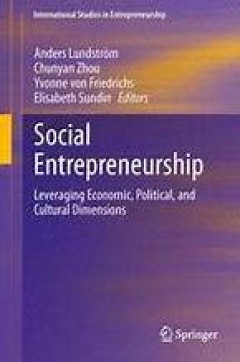Filter by

Social Innovation and Social Enterprises
This book provides an exhaustive, critical analysis of the challenges and opportunities associated with social enterprises and social innovation. More specifically, it addresses questions such as: What is a social innovation? Which are the best theories that explain how social innovations are generated and propagated in the global society? What is a social enterprise? Which are the theoretical…
- Edition
- 1
- ISBN/ISSN
- 978-3-030-96596-9
- Collation
- Business
- Series Title
- -
- Call Number
- 650

Handbook of Academic Integrity
The book brings together diverse views from around the world and provides a comprehensive overview of the subject, beginning with different definitions of academic integrity through how to create the ethical academy. At the same time, the Handbook does not shy away from some of the vigorous debates in the field such as the causes of academic integrity breaches. There has been an explosion of in…
- Edition
- 1
- ISBN/ISSN
- 978-981-287-098-8
- Collation
- Etika
- Series Title
- -
- Call Number
- 170

Technology Entrepreneurship
This collection of expert articles explores the development drivers of new technology-based firms and projects. It provides perspectives for an in-depth understanding of how technological inventions lead to the creation of new and sustainable companies or business units. The authors address methods and concepts that help technology-based start-ups and entrepreneurial projects successfully devel…
- Edition
- 1
- ISBN/ISSN
- 978-3-319-73509-2
- Collation
- Marketing
- Series Title
- -
- Call Number
- 658.8

Social Entrepreneurship
This contributed volume features state-of-the-art research from ten different countries on implementation, institutionalization and the future prospects of social entrepreneurship. This volume aims at bringing together research that considers the context of economy, politics and cultural issues combining with the needs of social and human development. By conceptualizing the notion of social ent…
- Edition
- 1
- ISBN/ISSN
- 978-3-319-01396-1
- Collation
- Sosial Ekonomi
- Series Title
- -
- Call Number
- 302

Effective Entrepreneurial Management
This textbook provides a comprehensive overview of the essential issues in effective entrepreneurial management. It first introduces readers to the fundamentals of entrepreneurial management, the nature of entrepreneurial managers and business planning, before exploring the specific topics of creativity and innovation, risk management, entrepreneurial marketing and organization as well as finan…
- Edition
- 1
- ISBN/ISSN
- 978-3-319-50467-4
- Collation
- Business Management
- Series Title
- -
- Call Number
- 650

Why Be Moral?
What reasons do we have to be moral, and are these reasons more compelling than the reasons we have to pursue non-moral projects? Ever since the Sophists first raised this question, it has been a focal point of debate. Why be Moral? is a collection of new essays on this fundamental philosophical problem, written by an international team of leading scholars in the field.
- Edition
- -
- ISBN/ISSN
- 9783110366396
- Collation
- 278 halaman
- Series Title
- -
- Call Number
- 100 LOU w

Encyclopedia of Global Bioethics
This work presents the first comprehensive and systematic treatment of all relevant issues and topics in contemporary global bioethics. Now that bioethics has entered into a novel global phase, a wider set of issues, problems and principles is emerging against the backdrop of globalization and in the context of global relations. This new stage in bioethics is furthermore promoted through the et…
- Edition
- 1
- ISBN/ISSN
- 978-3-319-09483-0
- Collation
- Kedokteran
- Series Title
- -
- Call Number
- 617

Contemporary Bioethics
This book discusses the common principles of morality and ethics derived from divinely endowed intuitive reason through the creation of al-fitr' a (nature) and human intellect (al-‘aql). Biomedical topics are presented and ethical issues related to topics such as genetic testing, assisted reproduction and organ transplantation are discussed. Whereas these natural sources are God’s specia…
- Edition
- 1
- ISBN/ISSN
- 978-3-319-18428-9
- Collation
- Kedokteran
- Series Title
- -
- Call Number
- 617

Technology Entrepreneurship
André Presse is Assistant Professor for Entrepreneurship, Technology-Management and Innovation at the University of Bolzano (UniBZ). He has received his doctorate in economics and management from the Karlsruhe Institute of Technology (KIT) where he worked with Goetz Werner, one of the leading entrepreneurs in Germany. André was a Postdoctoral Fellow at the Institute for Entrepreneurship, Tech…
- Edition
- 1
- ISBN/ISSN
- 978-3-319-73509-2
- Collation
- Manajemen
- Series Title
- FGF Studies in Small Business and Entrepreneurship
- Call Number
- 658

Arts and Humanities in Progress
The book aims to introduce a research concept called "Numanities", as one possible attempt to overcome the current scientific, social and institutional crisis of the humanities. Such crisis involves their impact on, and role within, society; their popularity among students and scholars; and their identity as producers and promoters of knowledge. The modern western world and its economic poli…
- Edition
- 1
- ISBN/ISSN
- 978-3-319-45553-2
- Collation
- Kesehatan
- Series Title
- -
- Call Number
- 613
 Computer Science, Information & General Works
Computer Science, Information & General Works  Philosophy & Psychology
Philosophy & Psychology  Religion
Religion  Social Sciences
Social Sciences  Language
Language  Pure Science
Pure Science  Applied Sciences
Applied Sciences  Art & Recreation
Art & Recreation  Literature
Literature  History & Geography
History & Geography